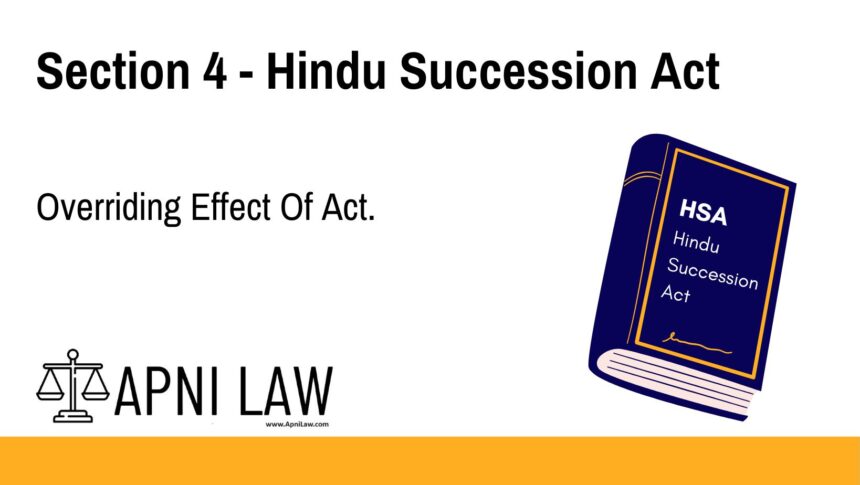Code – Section 4 of the Hindu Succession Act
—(1) Save as otherwise expressly
provided in this Act,—
(a) any text, rules or interpretation of Hindu law or any custom or
usage as part of that law in force immediately before the commencement
of this Act shall cease to have effect with respect
to any matter for which provision is made in this Act ;
(b) any other law in force immediately before the commencement
of this Act shall cease to apply to Hindus in so far as it is
inconsistent with any of the provisions contained in this Act.
(2) For the removal of doubts it is hereby declared that nothing
contained in this Act shall be deemed to affect the provisions of any
law for the time being in force providing for the prevention of fragmentation
of agricultural holdings or for the fixation of ceilings or for
the devolution of tenancy rights in respect of such holdings.
Explanation of Section 4 of the Hindu Succession Act
Section 4 of the Hindu Succession Act ensures that the provisions of this Act have an overriding effect. It explicitly states that any conflicting provisions from earlier Hindu laws, customs, usages, or other applicable laws will no longer be in force when they contradict the terms of this Act. The purpose of this provision is to harmonize the law and make it clear that the Hindu Succession Act takes precedence over earlier legal frameworks.
Key points to note:
- Any Hindu law or custom that existed before the Act, which contradicts any part of this Act, is no longer valid.
- Any previous law that conflicts with the provisions of this Act is rendered inapplicable to Hindus, ensuring uniformity in legal matters related to inheritance and succession.
Illustration
Example 1: Conflicting Customs and Inheritance Rules
Before the Hindu Succession Act, certain communities followed customs that denied women inheritance rights. Section 4 of the Act overrides such customs, ensuring that women now have the right to inherit property, as per the Act’s provisions.
Example 2: Pre-Existing Laws
Any state-specific laws or community-specific inheritance laws that were in place before the Hindu Succession Act and conflicted with its provisions are now inapplicable. For example, a law that limited the inheritance rights of daughters, if inconsistent with the Act, no longer holds.
Common Questions and Answers on Section 4 of the Hindu Succession Act
1. What is the significance of the “overriding effect” of the Hindu Succession Act?
- Answer: The “overriding effect” means that the provisions of the Hindu Succession Act take precedence over any conflicting earlier laws, customs, or usages, ensuring a uniform system of inheritance and succession.
2. Does Section 4 apply to all Hindus?
- Answer: Yes, Section 4 applies to all Hindus and overrides conflicting laws or customs related to inheritance, succession, or property rights.
3. Can any law override the provisions of the Hindu Succession Act?
- Answer: No, the provisions of the Hindu Succession Act take precedence over any other law in force, unless expressly stated otherwise within the Act itself.
Conclusion
Section 4 of the Hindu Succession Act emphasizes that the provisions of the Act supersede any previous laws, customs, or interpretations of Hindu law that are inconsistent with its terms. This ensures that the inheritance rights and succession laws laid out in the Act are uniformly applicable, removing inconsistencies from previous legal frameworks.








